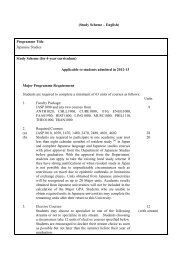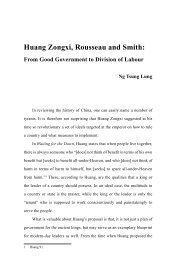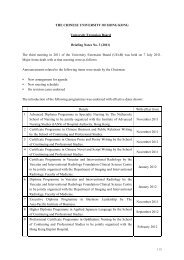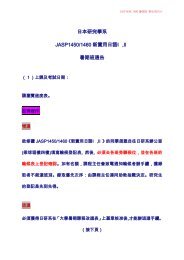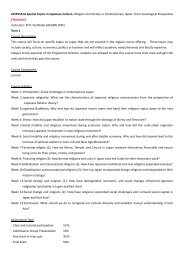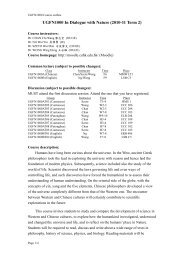ä¸è¼å ¨æ¸ - The Chinese University of Hong Kong
ä¸è¼å ¨æ¸ - The Chinese University of Hong Kong
ä¸è¼å ¨æ¸ - The Chinese University of Hong Kong
You also want an ePaper? Increase the reach of your titles
YUMPU automatically turns print PDFs into web optimized ePapers that Google loves.
Susan Gano-Phillips, Affective Learning in General Education 19<br />
the affective domain. Thus, depending upon the nature <strong>of</strong> the affective ILO,<br />
various experiential teaching and learning methods can be brought to bear on<br />
the situation.<br />
For a number <strong>of</strong> reasons, experiential learning is particularly helpful<br />
in meeting more complex (higher levels in the taxonomy) affective learning<br />
outcomes, such as valuing, organization, and characterization by a value set<br />
(Association <strong>of</strong> American Colleges and Universities, 2005). First, it allows<br />
students to practice applying theory to practice (e.g., as social workers<br />
complete internships in community agencies, they practice enactment <strong>of</strong><br />
their previously developed theories <strong>of</strong> social justice, thus demonstrating a<br />
characterization by a value set). Second, experiential learning helps students<br />
to develop desirable work skills such as the motivation to produce high-quality<br />
work or efforts to understand and appreciate alternative points <strong>of</strong> view. Third,<br />
these learning experiences can reinforce social and ethical values. Finally,<br />
experiential learning can be used across a broad spectrum <strong>of</strong> disciplines and<br />
in interdisciplinary contexts.<br />
In examining one <strong>of</strong> these innovative experiential pedagogies in more<br />
detail, we can consider its usefulness in achieving affective learning outcomes<br />
in general education courses or programs. Service learning is a strategy that<br />
integrates meaningful community service with instruction and reflection to<br />
enrich the learning experience, teach civic responsibility, and strengthen<br />
communities (Campus Compact National Office, 2001). Service-learning<br />
typically engages students in a three-part process: classroom preparation<br />
through explanation and analysis <strong>of</strong> theories and ideas; service activity that<br />
emerges from and informs classroom context; and structured reflection tying



